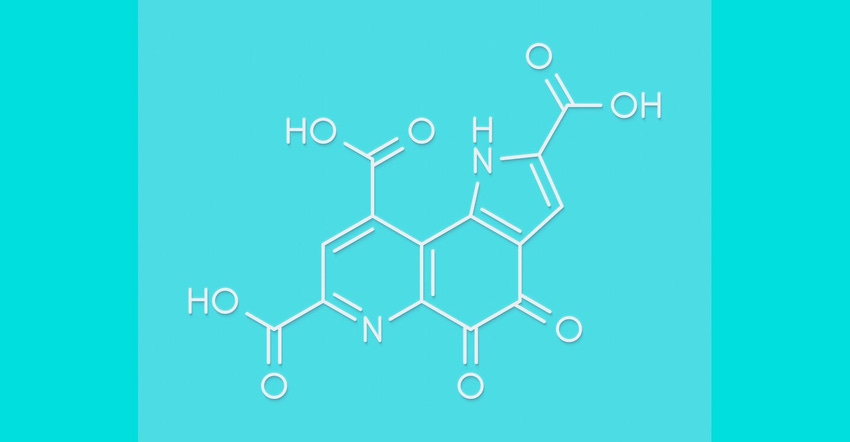PQQ for mental and physical fitness
PQQ, an antioxidant ingredient found naturally in vegetables, meat and breast milk has been clinically studied for its potential to improve brain health and boost energy levels.

It’s hardly a surprise that dietary supplements represent a hot market, and that sales are expected to rise significantly in the years ahead. Grand View Research projected the global dietary supplements market to reach US$194.63 billion by 2025, and expand at a compound annual growth rate (CAGR) of 7.8 percent during the period.
According to Research and Markets, the global brain health supplements market is expected to reach $11.6 billion by 2024, up from $2.3 billion in 2015.
An antioxidant ingredient found naturally in vegetables, meat and breast milk has been clinically studied for its potential to improve brain health and boost energy levels. The compound, pyrroloquinoline quinone (PQQ), appears to activate and increase levels of mitochondria, which are the powerhouse of cells.1
Enhancing the body’s power source
The effects of PQQ on mitochondria has been examined extensively in studies dating back 40 years, and as research has made clear, healthy mitochondrial functioning is essential for cognitive health2 and physical stamina.3
Mitochondria are found in nearly all types of human cells and are critical for maintaining the body’s metabolic processes and for breaking down cellular waste products. As the body ages, mitochondria decline or become damaged, leading to impairment in cognitive functioning and of vital organs such as the heart.4
PQQ promotes a process known as mitochondrial biogenesis, in which mitochondria divide and multiply. In an animal study, PQQ was shown to stimulate mitochondrial production at a rate of 500 to 1,000 times higher than other ingredients shown to support mitochondrial function.5 PQQ also appears to enhance a protein called nerve growth factor (NGF), which is composed of 118 amino acid residues that help regulate growth, maintenance, proliferation and survival of certain target neurons.6 Several studies indicate that PQQ potentially stimulates NGF and may help with growth and recovery of damaged nerves and organs.7
While a variety of supplements that make claims related to supporting mitochondria, consumers should choose products that are proven effective, well-researched, tested and safe to meet their health and energy needs.
More than 1,000 studies, including animal and human clinical trials, have been conducted on PQQ to measure its effectiveness and safety. A randomized, placebo-controlled and double-blinded study on 41 healthy elderly subjects who were each administered 20 mg/d of the ingredient for 12 weeks.8 The study showed significant improvements in subjects administered PQQ based on assessments measuring selective attention and visual-spatial cognitive functioning. Another eight-week study on 17 adult female subjects administered 20 mg of PQQ daily showed significant improvements in measurements for vigor, fatigue, tension-anxiety, depression, anger-hostility and confusion.9
Shoji Matsukawa, Ph.D., is vice president of Mitsubishi Gas Chemical America. Matsukawa has more than 15 years of experience in laboratory research, chemical plant engineering, product development and marketing, high performance materials and pharmaceuticals. He joined Mitsubishi Gas Chemical Co., the creator of BioPQQ, a branded pyrroloquinoline quinone ingredient, in 2003 after completing a doctorate degree in chemical engineering from the University of Tokyo, and began working with Mitsubishi Gas Chemical America, in 2017.
References:
Saihara K et al. “Pyrroloquinoline Quinone, a Redox-Active o-Quinone, Stimulates Mitochondrial Biogenesis by Activating the SIRT1/PGC-1α Signaling Pathway.” Biochemistry. 2017 Dec 19;56(50):6615-6625
Picarda M, McEwenb B. “Mitochondria impact brain function and cognition.” Proc Natl Acad Sci U S A. 2014 Jan 7; 111(1): 7–8. DOI: 10.1073/pnas.1321881111
Huertas J et al. “Stay Fit, Stay Young: Mitochondria in Movement: The Role of Exercise in the New Mitochondrial Paradigm.” Oxid Med Cell Longev. 2019; 2019: 7058350. DOI: 10.1155/2019/7058350
Jara C et al. “Mitochondrial Dysfunction as a Key Event during Aging: From Synaptic Failure to Memory Loss.” DOI: 10.5772/intechopen.88445
Saihara K et al. “Pyrroloquinoline Quinone, a Redox-Active o-Quinone, Stimulates Mitochondrial Biogenesis by Activating the SIRT1/PGC-1α Signaling Pathway.” Biochemistry 2017, 56, 50, 6615–6625
Akagawa M, Nakano M, Ikemoto K. “Recent progress in studies on the health benefits of pyrroloquinoline,” Bioscience, Biotechnology, and Biochemistry, 80:1, 13-22
Murase K et al. “Stimulation of Nerve Growth Factor Synthesis/Secretion in Mouse Astroglial Cells by Coenzymes.” Biochem Mol Biol Int. 1993 Jul;30(4):615-21.
Koikeda T, Nereno M, Masuda K. “Pyrroloquinoline Quinone Disodium Salt Improves Higher Brain Function.” Medical Consultation and New Remedies 2011. 48(5):1.
Nakano et al. “Effects of Oral Supplementation with Pyrroloquinoline Quinone on Stress, Fatigue, and Sleep.” Funct. Foods Health Dis. 2012 2. 307-324. DOI. 10.31989/ffhd.v2i8.81.
About the Author(s)
You May Also Like




.png?width=800&auto=webp&quality=80&disable=upscale)